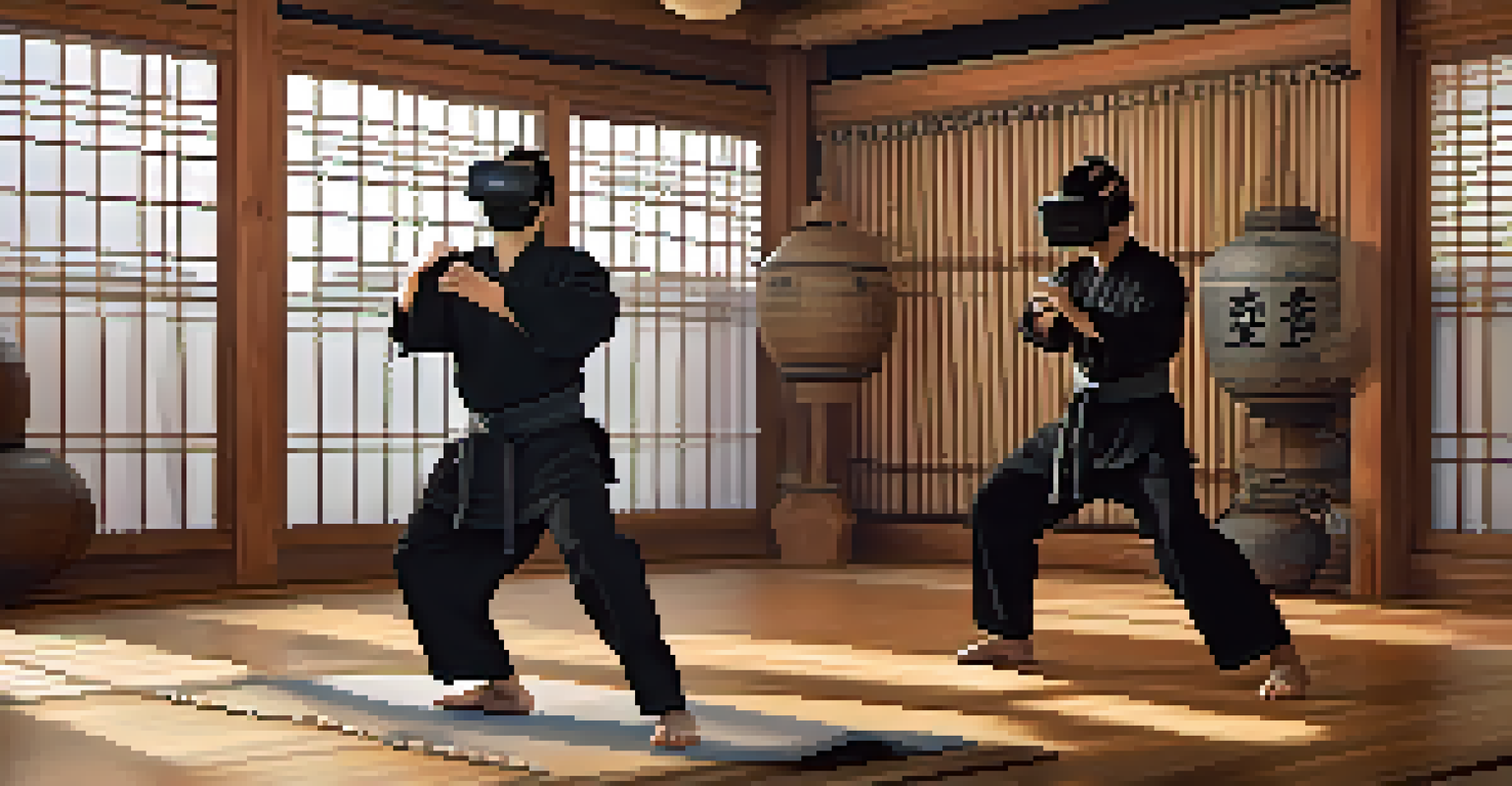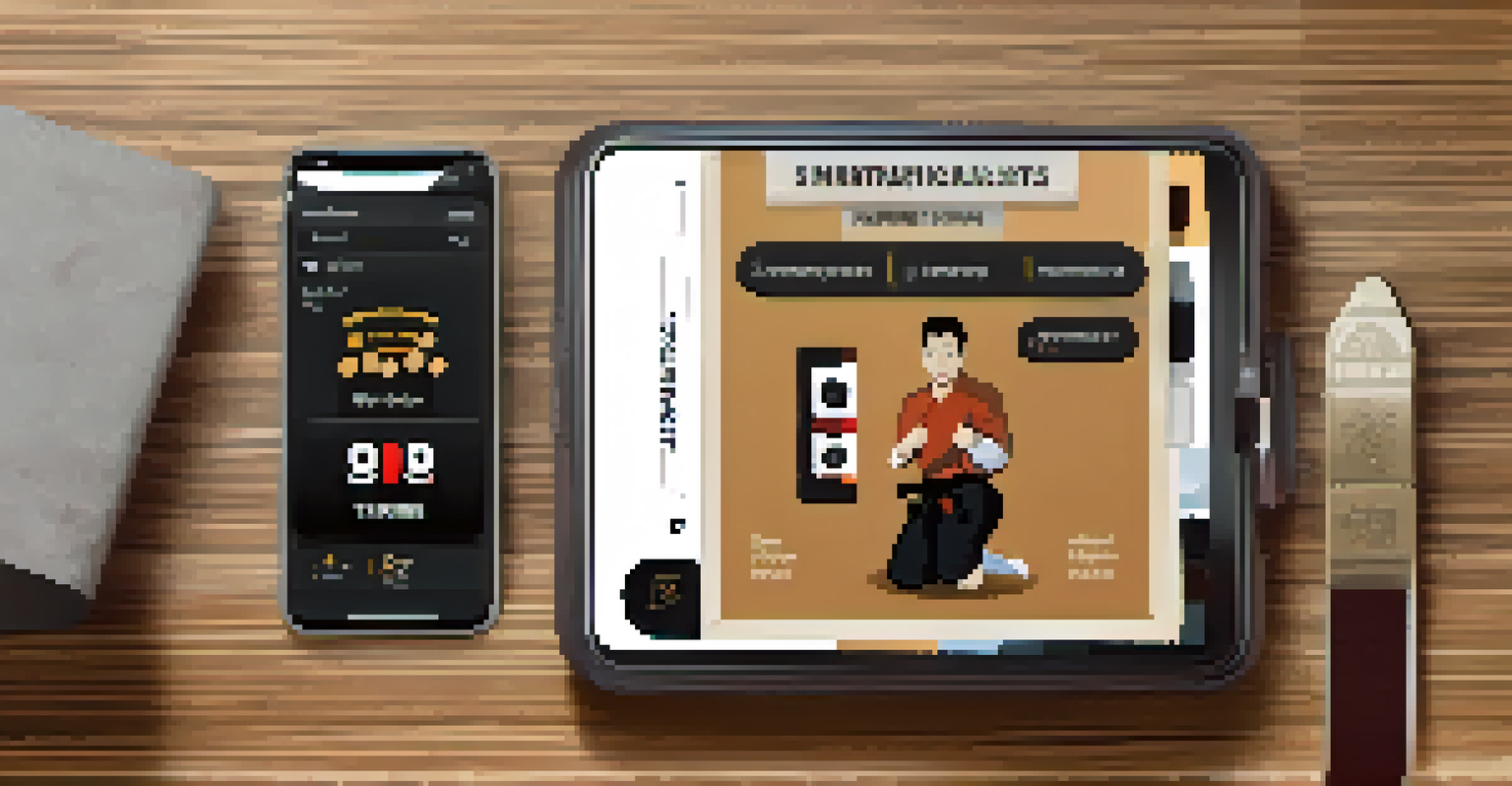The Future of Martial Arts Training in a Digital World

The Rise of Online Martial Arts Classes
The digital age has ushered in a new era for martial arts training, making it more accessible than ever. Online classes allow practitioners to learn from the comfort of their own home, breaking geographical barriers. Whether you're in a bustling city or a remote village, you can find a class that fits your schedule and skill level.
The journey of a thousand miles begins with one step.
These online platforms offer a variety of styles, from traditional karate to modern mixed martial arts. With video tutorials, live-streamed sessions, and interactive forums, students can engage deeply with their chosen discipline. Plus, the flexibility of learning at your own pace is a game changer for many.
However, this shift also brings challenges, such as the need for self-discipline and the potential for limited feedback from instructors. Nevertheless, the convenience of online training undeniably appeals to a diverse audience, making martial arts more inclusive.
The Role of Virtual Reality in Training
Virtual reality (VR) is not just for gaming; it’s making waves in martial arts training too. Imagine donning a VR headset and stepping into a dojo where you can practice techniques against a virtual opponent. This immersive experience can enhance muscle memory and reaction times, offering a unique approach to traditional training methods.

Moreover, VR allows for safe sparring without the risk of injury, which is especially beneficial for beginners. They can practice movements and strategies repetitively, building confidence before facing real opponents. This technology also enables instructors to simulate various fighting scenarios, providing a comprehensive learning experience.
Online Classes Expand Access
Digital platforms allow martial artists to learn from anywhere, breaking geographical barriers and offering diverse training options.
As VR continues to evolve, we can expect even more sophisticated training modules that adapt to individual progress. This could revolutionize how martial arts are taught, making advanced techniques accessible to everyone, regardless of experience.
Mobile Apps: Your Training Partner on the Go
In our fast-paced world, mobile apps have become essential tools for martial artists. These apps offer a range of features, from instructional videos to training logs, helping users stay organized and motivated. With just a few taps on your smartphone, you can access a wealth of resources tailored to your skill level.
Technology is best when it brings people together.
Some apps even include interactive elements, such as technique breakdowns and progress tracking. This gamification of training encourages users to set goals and celebrate achievements, making the journey more enjoyable. It’s like having a personal coach in your pocket, ready to guide you whenever you need it.
As technology advances, we can expect these apps to incorporate AI, offering personalized training suggestions based on user performance. This level of customization could further enhance the training experience, helping practitioners reach their goals more effectively.
The Impact of Social Media on Martial Arts Communities
Social media has transformed how martial artists connect, share, and learn from one another. Platforms like Instagram and YouTube allow practitioners to showcase their skills, share techniques, and offer support. This sense of community fosters collaboration and inspiration, breaking down the isolation that some may feel in their training journeys.
Additionally, social media serves as a valuable resource for finding training partners, instructors, and events. Users can engage with like-minded individuals from around the globe, exchanging tips and experiences. The ability to learn from a diverse range of perspectives enriches the martial arts experience.
VR Enhances Training Experience
Virtual reality technology provides immersive practice environments, improving muscle memory and offering safe sparring opportunities.
However, it’s essential to navigate this digital space mindfully. While social media can be a wealth of knowledge, not all information is accurate or beneficial. Practitioners should discern credible sources to ensure they’re learning safe and effective techniques.
Adapting Traditional Techniques for Digital Learning
As martial arts training moves online, there’s a natural tension between tradition and innovation. Instructors are tasked with adapting age-old techniques to fit the digital format while maintaining the integrity of the art. This requires creativity and a deep understanding of both the discipline and the capabilities of modern technology.
For example, breaking down complex movements into smaller, digestible parts can help online students grasp traditional forms effectively. Additionally, instructors can use video demonstrations to illustrate nuances that may be lost in text-based instructions. This hybrid approach allows learners to appreciate the depth of martial arts while benefiting from digital conveniences.
Ultimately, the goal is to honor the roots of martial arts while making it accessible to a broader audience. By finding the right balance, instructors can ensure that the essence of martial arts continues to thrive in the digital landscape.
Challenges of Digital Martial Arts Training
While the benefits of digital martial arts training are abundant, it’s crucial to acknowledge the challenges that come with it. One significant hurdle is the lack of personalized feedback, which is essential for mastering techniques. Without real-time correction from instructors, practitioners may develop bad habits that could hinder their progress.
Moreover, the absence of physical presence can make it difficult to replicate the energy and camaraderie found in traditional dojos. The social aspect of training is vital for many, fostering motivation and accountability among peers. Digital training can sometimes feel isolating, which may deter some from fully committing to their practice.
Community Building via Social Media
Social media connects martial artists globally, fostering collaboration, support, and access to diverse perspectives in training.
To overcome these challenges, practitioners should seek out virtual communities and engage with instructors who offer personalized feedback via video calls. By remaining proactive and connected, martial artists can navigate the digital landscape while still enjoying the benefits of community and guidance.
The Future: Blending Technology with Tradition
Looking ahead, the future of martial arts training likely lies in a harmonious blend of technology and tradition. As advancements continue to emerge, instructors and students alike will have opportunities to enhance their practice while honoring the roots of their art. This synergy can lead to a richer, more immersive learning experience for all.
For instance, imagine attending a live-streamed seminar with a world-renowned master while also practicing in your local dojo. The ability to access expert knowledge from anywhere in the world can elevate one’s training to new heights. As technology becomes increasingly integrated into martial arts, the possibilities are endless.

Ultimately, the essence of martial arts—discipline, respect, and perseverance—will remain unchanged. By embracing the tools and techniques of the digital age, practitioners can ensure that these values continue to thrive, inspiring future generations of martial artists.